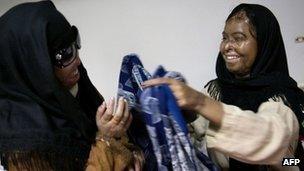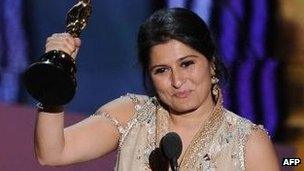Pakistan acid victims try to block Saving Face film
- Published

Attack survivor Naila, right, who featured in the film, says she fears the attention it could bring at home
Acid attack survivors whose plight featured in an Oscar-winning film are threatening to go to court to stop it being shown in Pakistan.
The film, Saving Face, was feted around Pakistan when it won the coveted gold statuette in February.
But now relations between filmmaker Sharmeen Obaid-Chinoy and some of her documentary subjects have turned sour.
The survivors say they could be at risk of a backlash and even further acid attacks if the film is shown at home.
At the centre of the dispute is the question of whether the survivors featured in the 40-minute film gave permission for it to be screened in Pakistan.
Saving Face, which won the Oscar for the best documentary in the short subject category, shows an acclaimed British-Pakistani surgeon, Mohammad Jawad, travelling around the country to perform reconstructive surgery on survivors of acid violence.
Survivors going through the recovery and reconciliation process tell their stories.
'Disrespect'
But the exposure and recognition enjoyed by the film and its makers since has failed to impress some of the acid attack survivors who feature in it, says the BBC's Shahzeb Jillani.

At the time, Sharmeen Obaid-Chinoy's Oscar win got a rapturous reception inside Pakistan
"We had no idea it would be a hit and win an Oscar. It's completely wrong. We never allowed them to show this film in Pakistan," Naila Farhat, 22, who lost an eye to an acid attack, told AFP news agency.
"This is disrespect to my family, to my relatives and they'll make an issue of it... We may be in more danger and we're scared that, God forbid, we could face the same type of incident again.
"We do not want to show our faces to the world."
Lawyer Naveed Muzaffar Khan, who is representing the women, told BBC Urdu's Nosheen Abbas that "there was a consent form but they have not agreed to the film being screened in Pakistan".
He says legal notices have been sent to Ms Obaid-Chinoy and a fellow producer, Daniel Junge.
If they fail to agree to withhold the film's release in Pakistan, lawyers for some of the women in the film say they will seek a court injunction to prevent it being screened.
But Ms Obaid-Chinoy insists the women have signed legal documents allowing the film to be shown anywhere in the world, including Pakistan.
She told AFP that one woman featured, Rukhsana, had already been edited out of the version to be shown in Pakistan out of respect for her concerns.
- Published29 February 2012
- Published29 February 2012